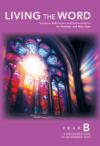Scripture Study for
Third Sunday of Easter
Acts 2:14, 22–33 / Psalm 16:11a / 1 Peter 1:17–21 / Luke 24:13–35
<< Back to LECTIONARY RESOURCES
Understanding the Word
By Br. John R. Barker, OFM
Peter’s speech at the beginning of Acts explains the meaning of the coming of the Spirit, the effects of which his audience has just witnessed. Despite doing good deeds, Jesus was put to death, yet resurrected, a sure sign that he was not under God’s judgment but was, on the contrary, God’s Messiah. The citation from Psalm 16 demonstrates that this resurrection was part of a divine plan foretold long ago. This same resurrected Christ is the source of the Holy Spirit, whose coming they have witnessed. Jesus himself, his works, his death, his resurrection and exaltation, and the coming of the Spirit are all the fulfillment of God’s “set plan.”
Peter reminds his audience of persecuted Christians that their permanent home is with God in Christ. They are sojourners who must not put their hope or faith in this world, but in Christ alone. Only in this way can they receive their eternal inheritance, which has been “bought” for them by Christ’s blood. Christ came so that those who believe in him might draw closer to God. By believing in the gospel, these new Christians (many of whom, as Gentiles, had not known the God of Israel) have come to believe in the God who brought it about. It is this God, and not the world or its many gods, in whom Christians are called to hope and have faith.
One of the chief obstacles to accepting that Jesus was the Christ was his crucifixion. Jews especially would find such an apparently failed Messiah incredible. As Jesus reveals through his opening of the Scriptures that the Messiah was indeed “supposed” to “suffer these things,” his listeners shed their despondency, realize that Jesus could have been the Messiah, and now find his resurrection credible. This lesson comes home to the disciples when they see Jesus “breaking the bread,” recalling to them the night he told his apostles that his body and blood were being given up for them. In light of the scriptures and his own words, the death of Jesus is seen not as an “accident” but ordained as a gift.
